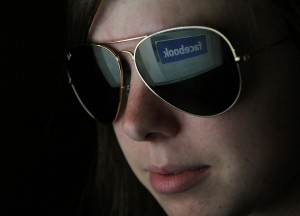Sept. 15, 2010
 |
Photo Illustration by Daniel Cernero |
By Meghan Hendrickson
Staff Writer
Walk into any college classroom, library or dormitory and one thing is evident: Facebook is everywhere.
Since its launch in February 2004, Facebook has grown to host more than 500 million active users.According to Facebook's website, people spend over 700 billion minutes per month on Facebook.
Originally created to provide a way for Harvard students to connect, college students across the globe have caught on to the social networking giantthat is Facebook.
With something that consumes so much of undergraduates' time, university researchers and administration are taking note of the positive and negative effects of Facebook.
Dr. Richard Beck, chair of the psychology department at Abilene Christian University, recently authored a study showing that college freshmen with a Facebook account were more likely to return to the same school their sophomore year.
"Facebook is an interesting phenomenon," said Dr. Corey Carbonara, Baylor professor of communication studies. "Starting in high school and moving forward, people's relationships are likely to be greater on Facebook than in person. Raving Facebook users are loyal to Facebook groups. I think that finding how that alliance fits with college students is worth studying."
Carbonara said he thinks it would be interesting to examine the difference between alienated college freshmen versus those who openly communicate and make connections with peers via Facebook.
"If your engagement is solely founded upon your ability to see one another based on both of your schedules, Facebook enables you to message someone on your way to class," Carbonara said. "This form of social bonding is definitely an adhesive. Facebook also fosters finding something in common. When freshmen meet new people at Baylor, they are then able to find out on Facebook if they share any common interests with others, therefore making it easier to develop a friendship."
Though there are many benefits tied to Facebook, there are also negative consequences that devoted users may encounter, said Dr. Eric Darr, vice president and provost of Harrisburg University of Science and Technology in Pennsylvania.
This week, students and faculty at Harrisburg are experimenting with a social media blackout to reflect on the different uses of social media.
"The idea for focusing on social media was mine," Darr said.
"However, this is a collaborative effort to ban social media from our campus network for the week. We consider the blackout innovative."
Today, there will be a series of panel discussions with 20 representatives from government agencies and other relevant participants. The panel participants were put together by the faculty of Harrisburg. Several surveys will be taken to collect feedback about the weeklong social media fast.
Though it appears that Darr is anti-Facebook, he said he actually believes that social media adds great value to Harrisburg and its students, faculty and staff.
"I hope that our students become better at critically thinking about technology," Darr said.
"We are a science and technology-oriented university and we hope our students will create new technologies someday. We want our students to go out into the world and think critically about the technology they use and experience."
Carbonara said he thinks the social media fast may only encourage students to use Facebook more.
"Universities can ban social media, but all that does is raise more fuel for one's appetite to have it," Carbonara said. "I personally think the ban is extreme, but it does raise awareness of addiction. There is a temptation to always be engaged in Facebook."
Something that both Darr and Carbonara agreed upon is the fact that both strengths and weaknesses are associated with social media.
"Technology is a tool, neither good nor bad, until application comes in," Carbonara said.
No comments:
Post a Comment